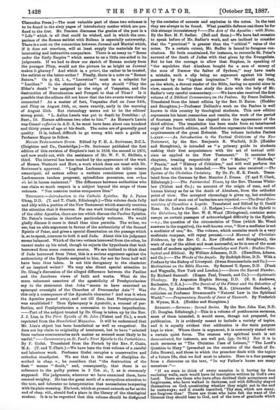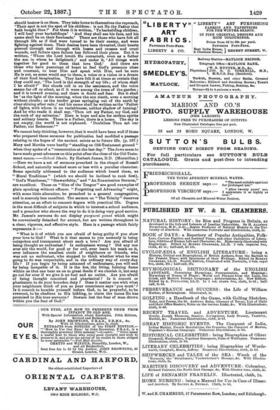SEEMONS.—Sermons Second Series. By the Rev. John Her, D.D. (D.
Douglas, Edinburgh.)—This is a volume of posthumous sermons, most of them intended, it would seem, though not prepared, for publication. It is evidently meant to include a variety of topics, and it is equally evident that edification is the main purpose kept in view. Where there is argument, it is commonly stated with a certain quiet force. The reasons why spiritual truth is not demonstrated, for instance, are well put. (pp. 94-96.) But it is in such sermons as "The Christian Uses of Leisure," "The Lord's Question to Mary " (preached on the occasion of the death of Dr. John Brown), and those in which the preacher deals with the topics of a future life, that we find most to admire. Here in a fine passage from a discourse on the text, "In my Father's house are many mansions ."—
" If we were to think of every mansion in it having its four enclosing walls, each would have its inscription written by God's own hand. There are those who have often doubted their acceptance and forgiveness, who have walked in darkness, and with difficulty stayed themselves on God, questioning whether they might not in the end be castaways ; and it stands inscribed, Thy sins, which are many, are forgiven thee.' There are those who have felt the want of the likeness they should bear to God, and of the love of gratitude which
should bestow it on them. They take home to themselves the reproach, ' Their spot is not the spot of hie children is not He thy Father that bath bought thee ?' For them it is written, Ye backsliding children, I will heal your backslidinge." And they shall see his face, and his name shall be on their foreheads.' There are those who have felt all through life as if God were turned to be their enemy, and were fighting against them. Their desires have been thwarted, their hearts pierced through and through with losses and crosses and cruel wounds, and failure upon failure has followed their plans. But it is written, Whom the Lord loveth He correcteth, even as a father the son in whom he delighteth ;' and under it, 'All things work together for good to them that love God.' And there are those who have yearnings of heart to feel God's presence close and constant, to hear Him and speak with Him, and be sure He is not, as some would say to them, a voice or a vision or a dream of their fond imagination. They have felt it at times so certain that they could say, The Lord is the strength of my life ; of whom shall I be afraid?' But clouds roll in on the assurance, and the voice seems far off or silent, as if it were among the trees of the garden ; and it is toward evening, and there is doubt and fear. But it shall be as the light of the morning, when the sun rieeth, even a morning without clouds ; as the tender grass springing out of the earth by clear shining after rain f and his name shall be written as the ' Father of lights, with whom is no variableness, neither shadow of turning.' And he who reads it shall say, Thom art my Father, my God, and the rock of my salvation.' Here is hope and aim for striken spirits and solitary hearts. There is a Father, there is a home. The sky is not empty, the world is not orphaned. ' Doubtless Thou art our Father, our Redeemer.'" We cannot help thinking, however, that it would have been well if those who prepared these sermons for publication had modified a passage relating to the hopes of the ancient saints as to future life. (p. 337.) Mary and Martha were hardly " standing on Old-Testament ground " when they spoke of a "resurrection at the last day." The Jews seem to have made great advances on this point after the close of the Old-Testa- ment oanon.—Sehool Ideals. By Herbert James, D.D. (Macmillan.) —Here we have a set of sermons preached in the chapel of Reagan Sohool, and naturally marked more or lees with a peculiar character. Some specially addressed to the audience which heard them, as "Moral Traditions" (which we should be inclined to rank first), "God's Watchmen," "Stewardship," and "An Examination Sermon," are excellent. Those on " Sins of the Tongue" are good examples of plain speaking without offence. " Forgetting and Advancing" might, with acme little alteration, be preached to a general congregation, and is scarcely lees excellent. The sermon on " The Trinity" deserves attention, as an effort to connect dogma with practical life. Dogma is the most difficult of subjects in which to interest a school audience, and a preacher who shows the way to do it is doing very good service. Mr. Tames's sermons do not display purpurei panni which might be conveniently detached for extract, but are written throughout in a clear, vigorous, and effective style. Here i3 a passage which fairly represents it What is it of which you are afraid of being guilty if you show your love to God ? What is it that seems to you unmanly in being outspoken and transparent about each a love ? Are you afraid of being thought an enthusiast ? Is enthusiasm wrong P Did any one ever stir the world, for good or for evil, ever leave his mark on it, ever influence the smallest circle of neighbours or friends, who was not an enthusiast, who stopped to think whether what he was going to do was respectable, and in the ordinary way of every-day life ? If you begin by being ashamed of enthusiasm, you will end by being incapable of it. It is the fire, the living, burning flame within us that can bear us on to great deeds if we cherish it, but may go out for ever if we give it no fuel and no outlet. Are you afraid of being thought conceited and pharisaical ? Is it conceit or phariaaism to do your bounden duty ? Does it matter one whit what your neighbours think of you no your conscience says you must' Is it conceit to humble yourself before God, to be prayerful, to he reverent, to be obedient to His bidding, to claim the boons He has promised to His true servants P Beware lest the fear of man drown within you the fear of God."







































 Previous page
Previous page